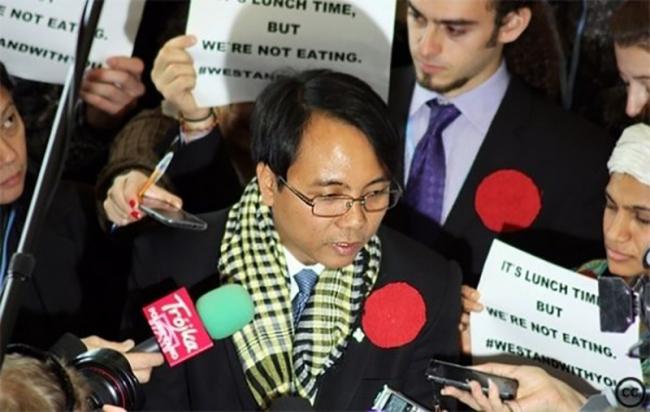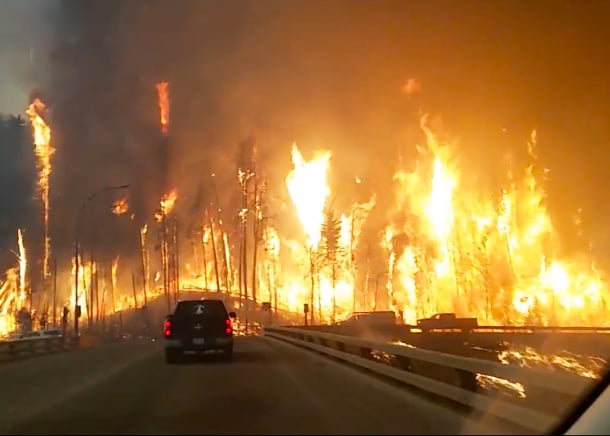Articles Menu

18 Dec 2019
Four years ago, the Philippines Commission on Human Rights began posing an incendiary question.
This includes the more than 6,300 Filipinos who died in 2013 during Typhoon Haiyan, which was made more destructive by rising global temperatures.
Four of the companies named in the investigation are Canadian oilsands producers — Canadian Natural Resources, Encana, Husky and Suncor — and Canadian environmental law experts like York University’s David Estrin presented evidence at hearings held by the commission.
The Tyee spoke with Greenpeace Southeast Asia executive director Naderev Yeb Saño, who was in Madrid for the climate talks, about the implications of the commission’s decision for Canadian oilsands producers and the political leaders, including Prime Minister Justin Trudeau, who support them. The conversation has been edited for length and clarity.
The Tyee: What did the commission decide? What was announced in Madrid last week?
Yeb Saño: The commission basically found that climate change constitutes an emergency situation. And it further concluded that the fossil fuel companies who are respondents in this case played a clear role in worsening climate change and its consequences. It also put forward the idea that climate-related human rights violations may be adjudicated under human rights law and can be addressed by human rights bodies or by other international institutions. This is the first time ever that a human rights body stated that fossil fuel companies can be found legally and morally liable for harms linked to climate change.
Four Canadian oilsands companies were named in the investigation. What does the commission’s decision mean for companies like them?
This is unprecedented. We’re trying to analyze what this means for the fossil fuel company respondents. What we think the implications of this could be for companies, including those four companies from Canada, is that they will have to face more forms of legal action in the future. The commission was also emphasizing in its statements that the legal liability for causing climate change is in some ways equal to the moral liability. So this sets a precedent in terms of moral responsibility. These companies will have to face that.

Prime Minister Justin Trudeau bought a pipeline with the goal of expanding oilsands production. So if companies that are involved in that industry are morally liable for human rights violations, does that make governments also liable?
In my view, I think the moral liability extends to those who allow fossil fuel companies to inflict harm, especially when it comes to human rights harms, the focus of this case. So if for example, Suncor is held morally liable, or any other company that the government in Canada is supporting, then would make the government complicit in the harms.
How would you expect to see courts in specific countries or jurisdictions use the findings of the Commission on Human Rights?
We are mindful that there are different legal frameworks in different jurisdictions. Future cases in courts will be able to build on what the Commission on Human Rights in the Philippines has accomplished and, based on their own laws and context, can hold fossil fuel companies liable for climate-related harms. The primary legal significance of the commission’s investigation is an acknowledgement that companies investing in new fossil fuel projects are knowingly committing human rights violations. That includes building a new coal-fired power plant or a tarsands projects or an oil pipeline.
Ordinary people need to take a stand. They need to be extraordinary in extraordinary times. And I think this is the moment for people to join the global movement on climate change. Because we see a groundswell of legal cases on climate change happening in different parts of the world. I think it’s time that people support that, and also go beyond litigation. People need to stand with young people expressing their frustration and indignation against climate injustice and inaction. There’s lots of things that individuals can do. But what I would say to individual people is that they should not believe even for a second that this is any individual’s fault. The climate crisis is the fault of the fossil fuel industry largely, and the governments that support it. This crisis has been caused by the decisions of a few, which have affected the lives of so many.
Let’s look ahead to the year 2030. What’s a best-case scenario for what the world could look like if ordinary people convinced governments and other institutions to actually take this emergency seriously?
2030 is just around the corner, it’s 10 years away. The fossil fuel industry for so long denied the science and hid the truth from the public. And we’ve lost a lot of time because of that. We could have had a head start in solving climate change, but now we are in a climate emergency. I have absolutely no illusion that things will be better in 10 years. Things will get worse before they get better. But my optimistic side sees in 10 years a world that is truly on its way to eliminating fossil fuels. It should be already on its way to towards the end of the fossil fuel era. That would allow us to truly move towards a cleaner future. ![]()
[Top photo: Greenpeace Southeast Asia executive director Naderev Yeb Saño has long pressed for action against climate change. He led a hunger strike as lead Filipino delegate to the 2013 UN climate summit. Photo: Creative Commons, courtesy tcktcktck.org.]